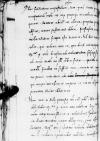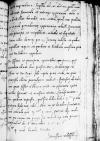Letter #3008
Stanisław WŁOSZEK to Ioannes DANTISCUSVilnius, 1546-11-06
| received Heilsberg (Lidzbark Warmiński), 1546-11-17 Manuscript sources:
| ||||
Text & apparatus & commentary Plain text Text & commentary Text & apparatus
Reverendissimo in Christo Patri et Domino, domino
Reverendissime in Christo Pater et Domine, domine gratiosissime. Commendatis deditissimis servitiis in gratiam Reverendissimae Paternitatis Vestrae.
Litterae Reverendissimae Paternitatis Vestrae declarant benignum animum eius erga me in dies magis ac magis augeri, non solum enim tabellarium non dimittit vacuum, quin adauctae benignitatis ferat testimonia, sed suadet monetque, qui fortunis meis ea, qua alii via istic in  BK, 230, p. 194
hoc sustentare corpusculum possum superinscribed⌈possumpossum superinscribed⌉, tum quod tanta premor occupationum mole, ut vix propriis incumbere interdum queam, tantum abest, ut aliena perpetuo praesertim absens curare possim aut debeam, persuasum etiam habeo mediocritatem semper esse tutiorem. Sed haec non non eo dict[...] hidden by binding⌈[...][...] hidden by binding⌉ velim, qui videar non ea, qua decet animi gratitudine Reverendissimae Paternitatis Vestrae benefaciendi voluntatem suscepisse, eius enim nomine tantum me illi debere fateor, quantum ad perssoluendum falultas non sufficit mea, verum ut cognoscat me paucis contentum ab omni honorum strepitu abh eos, qui magno interdum et corporis et animae dispendio parantur, titulus abhorrere.
BK, 230, p. 194
hoc sustentare corpusculum possum superinscribed⌈possumpossum superinscribed⌉, tum quod tanta premor occupationum mole, ut vix propriis incumbere interdum queam, tantum abest, ut aliena perpetuo praesertim absens curare possim aut debeam, persuasum etiam habeo mediocritatem semper esse tutiorem. Sed haec non non eo dict[...] hidden by binding⌈[...][...] hidden by binding⌉ velim, qui videar non ea, qua decet animi gratitudine Reverendissimae Paternitatis Vestrae benefaciendi voluntatem suscepisse, eius enim nomine tantum me illi debere fateor, quantum ad perssoluendum falultas non sufficit mea, verum ut cognoscat me paucis contentum ab omni honorum strepitu abh eos, qui magno interdum et corporis et animae dispendio parantur, titulus abhorrere.
Novi nunc in aula  BK, 230, p. 195
tia in meo(?) redditura. Sigillum enim, ut aliae res paene omnes, mihi erat servandum et notariis exponendum, nunc
BK, 230, p. 195
tia in meo(?) redditura. Sigillum enim, ut aliae res paene omnes, mihi erat servandum et notariis exponendum, nunc
De
Dat(ae) or Dat(um)⌈Dat(ae)Dat(ae) or Dat(um)⌉
Reverendissimae Paternitatis Vestrae humilis servitor



